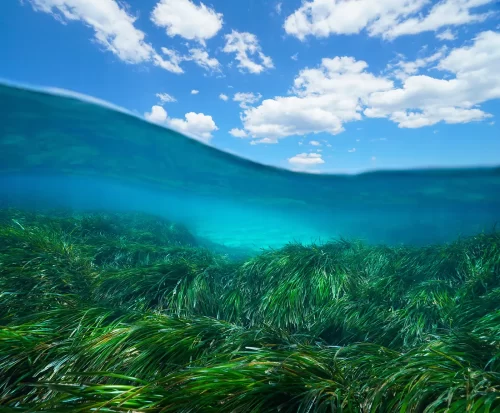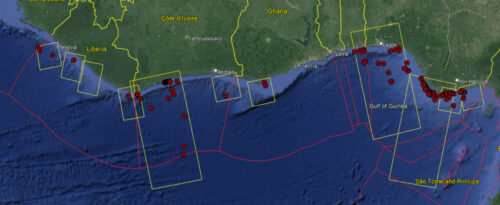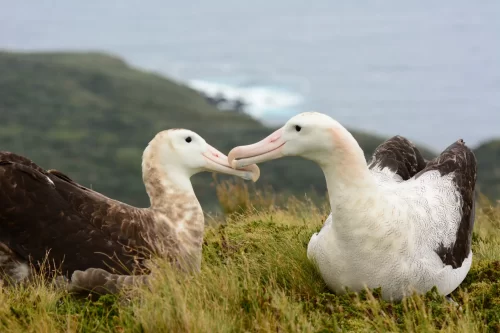International collaboration and information sharing are key to detecting suspicious vessels and achieving well-managed fisheries.
The U.S. Coast Guard (USCG) Cutter DOUGLAS MUNRO recently completed a nearly two-month patrol, traveling 12,500 miles (20,117 km) throughout the ocean in support of Operation North Pacific Guard, an annual high seas fisheries law enforcement operation designed to detect and deter illegal, unreported, and unregulated (IUU) fishing.

Global Fishing Watch provided information for this year’s operation to highlight suspicious transshipments at sea and identify vessel tracks that appeared to be spoofed or intentionally manipulated to report false information. The collaboration built on the successful, inaugural support that Global Fishing Watch provided to the USCG Cutter MELLON in 2019, which saw a threefold increase in vessel boardings and an eightfold increase in identified violations compared to 2018.
Global Fishing Watch spoke with USCG Rear Admiral Matthew Bell to hear more about the 2020 patrol in the North Pacific Ocean, the challenges of at-sea enforcement, and the importance of collaboration to tackle IUU fishing.
This interview was edited for clarity and length.
Q: What is the origin and ambition of Operation North Pacific Guard, and who is involved?
Operation North Pacific Guard is an annual high seas cooperative international law enforcement operation led by the USCG, designed to detect and deter IUU fishing activity. The operation is designed to be a joint enforcement endeavor by North Pacific Rim nations, including Japan, China, Russia, South Korea, Canada, and the United States. For over 25 years, we have patrolled the North Pacific seeking out illegal high seas fishing. When we first started patrolling the North Pacific, we focused our effort on illegal high seas drift nets that stretched miles and indiscriminately caught and killed any marine life in their path. We have more recently expanded the enforcement effort to incorporate all legally binding conservation and management measures adopted by several regional fisheries management organizations (RFMO). The principal ambitions are a tall order for our small organization, but are righteous compared to the threat – through Operation North Pacific Guard, we will endeavor to maintain maritime rules-based order, protect legitimate economies, and strengthen regional and national security, all while defending world food availability.
Q: What challenges does the annual North Pacific patrol present and how can multilateral coordination and cooperation help overcome them?
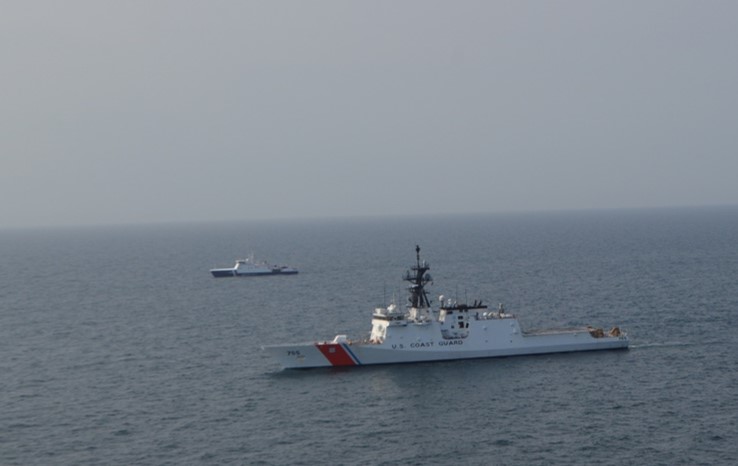
I think that the first and foremost challenge is the tyranny of distance. The waters covered by Operation North Pacific Guard and the expansive threat of illicit activity are enormous compared to the current level of enforcement effort. The USCG cannot do it alone. To effectively monitor such a large area, other countries – particularly those whose vessels are engaged in fishing – must increase their commitment to multilateral fisheries enforcement cooperation. The USCG relies upon collaboration with like-minded partners, and will continue to lead and expand those relationships that reinforce maritime governance. Bottom line – the USCG can and will continue to patrol, but we can’t make true progress towards long-term sustainability without collective international commitment to enforcement efforts and accountability.
Q: Can you tell us more about the patrol this year and the outcomes?
This year’s operation ran for 59 days and included intelligence support and operational assets from Canada, and Japan, as well as plenty of intelligence support from Global Fishing Watch. The USCG’s primary surface asset was the Cutter DOUGLAS MUNRO – commissioned in 1971, the ship is the last remaining high endurance cutter in our fleet. Supported by a multilateral intelligence effort to detect suspicious activity, the DOUGLAS MUNRO crew conducted at-sea inspections on 11 fishing vessels from four different nations during this year’s operation and found 14 purported violations, including potential serious violations aboard three Chinese flagged squid fishing vessels. Following these boardings, a fleet of 31 Chinese flagged vessels stopped fishing and fled several hundred nautical miles west across the Pacific Ocean, avoiding further inspection – certainly raising suspicions that they, too, were involved in illicit activity. In August, the crew conducted a boarding of a Chinese Taipei-flagged vessel and found four potential violations. We were pleased to see Chinese Taipei take swift action and hold the vessel owner and master appropriately accountable with a fine equivalent to $63,000 USD.
Q: What value did Global Fishing Watch data and analysis bring to this year’s patrol?
The Pacific Ocean is a really big ocean and we’re trying to find the proverbial needle in a haystack. Any information or intelligence we can have that helps us predict fishing activity means we can pre-position our assets – instead of coming in from the front we can come in from the back, and a little bit of surprise on our part goes a long way to detecting vessels that don’t seem to be abiding by the rules.
Armed with the information and thoughtful analysis provided by Global Fishing Watch we are able to focus scarce resources on the right targets, in the right place, at the right time.
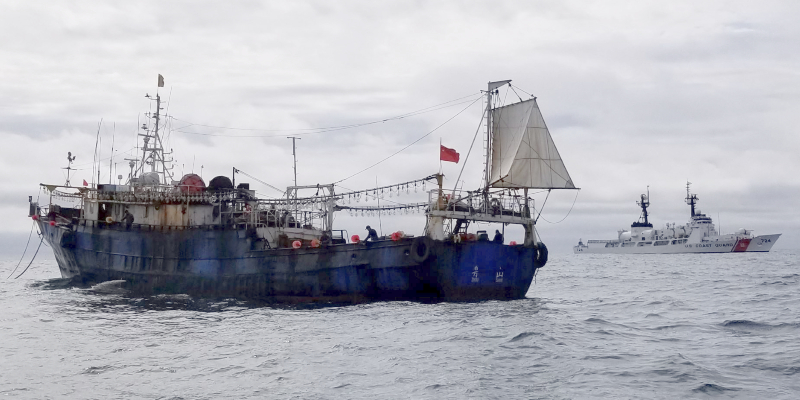
Q: What benefits can and does Global Fishing Watch bring to maritime monitoring and enforcement efforts?
Global Fishing Watch provides intelligence and analysis that contributes to the USCG’s ability to zero in on suspicious activity. Fusing multiple layers of intelligence from several nations with Global Fishing Watch’s analysis yields more targeted, effective, intelligence-driven enforcement operations.
USCG District 17’s collaboration with Global Fishing Watch started in 2019, with Global Fishing Watch providing intelligence support to Cutter MELLON. This intelligence identified optimal targets, leveraged limited resource allocation, and increased the detection of violations.
Simply put, Global Fishing Watch’s contributions are a force multiplier. This is a model for counter-IUU fishing operations around the globe and perfectly aligns with the USCG’s new IUU Fishing Strategic Outlook.
Q. How can greater transparency in fishing activity serve to strengthen maritime security?
Sharing information is incredibly important. The better data we have, the more transparent data we have, the better that we’re able to predict activity or use information to determine hotspots or where best to position our assets.
Data is key; everybody should have access to the same set of data, and be open to sharing between industry, management bodies, enforcement agencies and the scientific community. All the oceans are connected, fish stocks are connected, and all of these international and national entities are all connected, so we all have to work together.
Q: What further action is needed to detect and deter IUU fishing in the North Pacific?
The long-term intent of Operation North Pacific Guard is for each of the member nations to contribute operationally by providing surface and air patrols, and share intelligence that facilitate at-sea inspections targeting IUU fishing activity. The vast area of the North Pacific Ocean can only be effectively covered with support from all the North Pacific Rim nations. Increased commitment from all partner countries to provide intelligence support and at-sea enforcement capability, particularly those nations whose vessels are engaged in fishing, is absolutely critical to both the health of world fish stocks and the future success of Operation North Pacific Guard.
Following at-sea enforcement operations, flag States need to take seriously their responsibility to investigate and sanction IUU fishing activity. When flag States fail to hold their fishing fleet accountable for complying with RFMO conservation and management measures, or actively obstruct the enactment of meaningful regulatory measures, they undermine rules-based order in the maritime domain.
Finally, continued efforts in criminal network analysis will better allow future enforcement efforts to focus on targets that produce more impactful results; but again we depend on the cooperation and accountability efforts of the flag State.
Sarah Bladen is the directof of communications at Global Fishing Watch.
